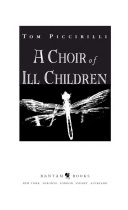A Choir of Ill Children

A CHOIR OF ILL CHILDREN (2003)
by Tom Piccirilli
I intend to read this novel for the first time and slowly savour it the way that I preternaturally sense that it deserves to be read.
If I should also real-time review it, my thoughts will appear gradually in the stream to be found below or by clicking on this post’s title above.

“She’s the kind of girl who might smuggle hashish in the binding of D.M. Thomas’s ‘The White Hotel’.”
The Narrator, Thomas, lets drop that his three brothers, Jonah, Cole and Sebastian, are Siamese triplets (although he may not agree with that terminology), triplets with joins at such points of the body that their phenomenon all seems paradoxically impossible yet possible within the instinctive world of this text. One of their joins is to to be able or be forced to share the syllables of a single word.
A swamp community, and I already have a strong feel for the place, for Thomas’s circumstances, for the dual TV crew come to documentise the family, for the loving urges of each triplet separately – and for the Godly aura or hinterland that pervades the land, so much so I wonder (without any real direct evidence from the text) whether the Holy Trinity as a Christian Mystery – of three separate leitmotifs and a single gestalt? – is a pervasive force, too. Whatever the case, I am already half-subsumed by the text, struck by its sense of its triumvirate of wonder, place and people, plus a smidgen of singular fear at what I have learnt of those joins.
“To lay her down on silk sheets, dapple her pale cheeks with rose petals, and read ‘Les Fleurs Du Mal’ to her in French. I’ve done it to others.”
I didn’t predict what I was to land myself into when first starting this book yesterday, despite my claims otherwise. It seems to be a very powerful spike-ball gestalt of the suppurating separates or curative curds of humanity’s physical and spiritual condition, involving the cultural and the trashily ephemeral, the porous ability of bodies to join and interchange in empathy or resistance, lovesex and swamp, God and Evil, faith and fellatio, writing as writing or as the cruellest form of tattoos. A strikingly original portrayal of a community and a family within that community interpersonally ricocheting with others, either taut on high-wire or kicking dogs at ground level. Natural and drug-induced inspiration. All in a language Thomas uses that actually deploys IN ITSELF the spike-ball gestalt I mentioned above.
“Jonah recites the names of symphonies, poems and sit-coms, from the core of his third of that brain.”
“I haven’t brought the Holy Spirit down on him this time. It’s the beauty of the morning, the taste of too much sweetness.”
This is the the best book simply about spasms – as well as containing its own intrinsic spasms – that I have ever read.
The flat rock girl, Drabs’ sugar rush, a primordial and ramshackle Twin Peaks community with Mill and a deep-rooted Hex of Sex. With a cornucopia of ‘objective correlatives’, just as one example, some Meloy dog-kickers. Magic-Real high-wirers, and the prospect of a carnival’s arrival. I shudder as I think of the root of the word ‘carnival’, and feel more and more this book’s sense of both Evil and a Holy Spirit, two sides of my earlier premonition of the III Trinity… Three, not Ill.
Thomas calls these factors a “convergence corridor”…
Thomas, both Doubter and Seeder?
I shall give the tightrope of this text a bit of slack until at least tomorrow.
“Sebastian is delirious with fury, his complaints coming from three throats, hitting three different notes, harmonizing well with a little doo-wop shuffle going on.”
“The mouths are going at once, all of them talking at the same time with a dissonance of words, the tributary voice, the subtext and cacophony of tone and meaning.”
Thomas questions his own powers, his own mission, amid a tempest, next to a Wallenda Monastery conceit in his soul, as if this hybrid text itself is the sister he sloughs off.
A secret agent for investigating, not a missing child or such Twin Peaks like mystery, but the opposite-of-missing flat stone girl near the monastic.
There are some amazing passages in these pages that evoke the human condition that all of us recognise by being human, whether it be in swamp or city, here the hexed, polarity-sexed swamp, and its kitchen corner bruises.
I am human but I try to slough off my humanity while I test-run this text, try to catch its dream – or nightmare.
“Instead I’d become turned around and continued heading deeper into the broad channels of slough,…”
Taken separately if perhaps not in context, this section is possibly the most moving fable in all literature, telling of Thomas as narrator following his mother’s voice towards the seemingly troubled man, boy and bull stuck in the swamp. The fable’s moral is the most inscrutable and beautiful I have ever encountered. Including, beforehand, this passage that, in the circumstances, means more than can be told, whoever told it to whom in or out of context:-
“‘I bet this here story receives some national coverage on the TV, and folks from all around our great nation will hail your name.’
‘You really think so?’
‘For certain. And tell me now, just what is your name?’
‘Thomas.'”
Not that I know the circumstances nor the full context.